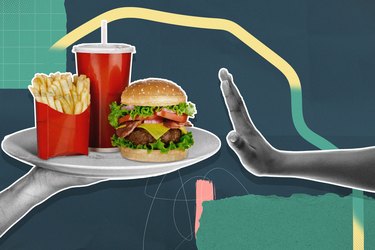
No one's saying you should quit eating a burger and fries. There's a place for fast food in a healthy diet that goes beyond getting the nutrients you need: Sharing a pizza with friends can bring joy. But if you're thinking of skipping the drive-thru for good, there are some notable health perks.
That's because fast food tends to be made up of heavily processed ingredients, such as refined carbohydrates and added sugars. It's also often high in sodium and saturated fat, says Bianca Tamburello, RD, a dietitian at FRESH Communications. All of these components can negatively affect your heart, gut and metabolic health.
Video of the Day
Video of the Day
"As much as I love focusing on positives versus negatives, research shows that many chronic diseases are lifestyle-induced and many heart attacks and strokes could be prevented by incorporating healthier lifestyle habits," says Crystal Scott, RD at Top Nutrition Coaching. "With that being said, it is more about food quality and macro/micronutrient composition. Fast food has less fiber, less water and more saturated fats and sodium than whole foods."
So eating more fast food means you're getting less nutrient-dense foods that your body needs, Scott explains. By quitting fast food, you may take in fewer calories and increase your fiber, vitamin and mineral intake because doing so creates space for more vegetables, fruits, whole grains, healthy fats and lean sources of protein in your diet.
Ahead, we break down the ways quitting fast food can positively affect your health.
Your Gut Health Will Improve
Bidding fast food adieu, or at least restricting it, can improve your digestion because you're making more room for whole foods rich in fiber and probiotics in your diet.
"High-fat and high-sugar fast foods can wreak havoc on the gut by promoting the growth of unhealthy gut bacteria. Eating more high-fiber foods (such as fruits, vegetables and whole grains) and probiotic-rich foods (like yogurt and sauerkraut) feeds the healthy gut bacteria and promotes proper gut balance," Tamburello says.
A September 2021 study in Diabetes Care found that those who ate fried meat (a fast food staple) four times a week had lower microbial diversity in their gut and decreased strains of bacteria that play a role in preventing obesity and insulin resistance than those who didn't eat fried meat.
And because your gut is intrinsically linked to your immunity and mental wellbeing, these areas of your health may be positively affected, Tamburello says.
According to a July 2019 review in Nutrients, eating foods with prebiotics and fiber increases the number of beneficial bacteria in your gut, which is linked to a reduced risk of heart disease and type 2 diabetes.
You'll Lower Your Risk of Heart Disease
Many typical fast foods, like chicken nuggets, milkshakes and French fries, are rich in sodium, saturated fat and added sugar, which can elevate your LDL "bad" cholesterol and increase your risk of heart disease and high blood pressure, according to the Mayo Clinic.
"When we consume a diet heavy in saturated fat, it raises LDL levels in the blood and blood pressure, which puts you at greater risk of heart disease and stroke," Scott says.
According to an October 2021 review in Heart, loading up on fried foods versus eating small amounts may increase the risk of heart disease, stroke and heart failure.
And taking in too much sugar from soft drinks, milkshakes and other frozen treats commonly served at fast food restaurants can cause chronic inflammation in your body, which can be taxing on your heart and blood vessels, per the Cleveland Clinic.
"Eating less sodium, saturated fat and added sugar from fast food can drastically improve your heart health and decrease your risk of heart disease by promoting healthy blood pressure and better cholesterol levels," Tamburello says.
"Replacing highly processed fast foods with whole foods high in fruits, vegetables, whole grains and lean protein and can also decrease chronic inflammation, which contributes to better heart health."
You'll Have Better Blood Sugar Control
There's no crime in enjoying a drive-thru ice cream sundae, but eating high amounts of added sugar too often can put you at risk for prediabetes, type 2 diabetes as well as metabolic syndrome.
Metabolic syndrome happens when you have several health conditions, including high blood pressure, high blood sugar, excess abdominal fat and high cholesterol or triglycerides, Tamburello explains.
"Metabolic syndrome is dangerous because it increases one's risk of heart attack, stroke and diabetes. Eating less fast food high in calories, saturated fat, sodium and added sugar can help prevent metabolic syndrome."
When you consume too many refined carbs and added sugar, your body may not produce enough insulin to help your cells absorb the glucose, leaving an excess in your blood, according to the American Diabetes Association (ADA). This results in hyperglycemia, which can lead to ketoacidosis, or diabetic coma, per the ADA.
"Consumption of foods with higher amounts of added sugar and fat and consuming fewer foods high in fiber, like fruits and vegetables, showed an increased risk of diabetes," Scott says. "I do not think that fast food alone is the root cause of diabetes, metabolic disorders or even cholesterol and blood pressure, but a combined effect with decreased activity levels, decreased adequate hydration and a decrease in fiber and vitamins and minerals."
By limiting your added sugar intake from fast food — and eating more nutritious, fiber-rich foods in their place — you can better manage your blood sugar levels.
"Eating more healthy unsaturated fats in place of saturated fats from fast food has been shown to prevent insulin resistance, which means better blood sugar control and prevention of diabetes. Naturally, eating less added sugars and refined starches from fast food prevents blood sugar spikes and promotes better blood sugar control, too," Tamburello says.
You Might Lose Weight
Fast foods are usually higher in calories than whole foods, like fruits and veggies. Although removing fast foods from your diet alone won't make you lose weight, it can contribute to your weight-loss goals. Fast foods also tend to be lower in protein and fiber, making them less filling. Subbing in nutrient-dense foods that are higher in protein, fiber and healthy fats in your diet can help you stay fuller longer.
"When you look at fast food, there is a decrease in nutrient-dense foods, lower volume foods, less fiber and increase in calories, which oftentimes leaves you feeling hungry and never fully satisfied," Scott says.
"By decreasing fast food and increasing lean proteins, complex carbohydrates full of whole grains and fruits and vegetables and healthy fats, like in avocados, you increase volume foods that are lower in calories, are more nutrient-dense and leave you full and satisfied, preventing overeating and in general promoting a healthier lifestyle."
You May Sleep Better and Have More Energy
Getting more restful zzzs at night might not be something you think of when you skip fast food for good, but because these foods are usually heavily processed and are high in added sugar, they can cause your blood sugar levels to spike and then dip low, Tamburello says. This can cause an energy crash and mess with your sleep.
When you incorporate more high-fiber foods, such as whole-wheat bread, fruits and vegetables, into your diet, it can prevent these big spikes and crashes, she says.
Another reason you might see improvements in your sleep and energy levels: Not getting enough sleep is associated with eating more sweets and fast foods, which increases ghrelin, a hormone that promotes hunger, Scott says.
"A low-quality diet high in added sugar and processed foods and low in fruits, vegetables and protein is associated with poor sleeping patterns. If you struggle with sleep, replacing fast food with high-quality, nutrient-dense foods such as fruits, vegetables, whole grains, nuts and seafood, may help you sleep better and stay asleep longer," Tamburello says.
You Might See an Improvement in Your Mental Health
Although research in this field is still growing, more recent studies show that your diet can affect your mental health.
For example, a December 2022 study in JAMA Neurology, which included more than 10,000 people, found that limiting ultra-processed foods, such as fast foods, is associated with reduced cognitive decline in middle-aged and older adults.
Another small January 2017 study in BMC Medicine found that people living with major depression who followed a 12-week diet high in vegetables and fruits, whole grains, legumes and lean protein and reduced their intake of fast foods saw an improvement in their depressive and anxiety symptoms.
The Bottom Line
While there's no need to quit fast food entirely, research shows that there are long-term health benefits to limiting your fast-food intake. Because you're decreasing the amount of calories, sodium, saturated fat and added sugar you're taking in, you'll see improvements in your heart health, blood sugar control, mood and sleep.
"[Quitting fast food] decreases the risk for cardiovascular diseases, Alzheimer's and Parkinson's disease. It also decreases the risk of depression and anxiety," Scott says.
The foods you replace fast foods with also matter. For better overall health, choose whole foods, like fruits and vegetables, whole grains, beans, healthy fats and lean protein, Tamburello says. These foods provide important vitamins, minerals and antioxidants your body needs to help prevent disease.
That said, you don't have to give up all of your favorite fast foods for good to reduce your health risks. You can still enjoy your go-to milkshake, burger and fries as part of a balanced lifestyle.
"I think you can have a well-balanced diet without being overly restrictive by following the 80-20 rule: 80 percent of the time, you're consuming lean proteins, fruits and vegetables and healthy fats, and 20 percent [of the time you're] enjoying other foods like fast food," Scott says.
"By doing that, you can remove yourself from 'food jail,' remove guilt and shame around food and allow yourself foods in moderation. This builds a really healthy relationship with food and being able to be more mindful when it comes to choices."
- Nutrients: "Gut Microbiome: Profound Implications for Diet and Disease"
- Diabetes Care: "The Association of Fried Meat Consumption With the Gut Microbiota and Fecal Metabolites and Its Impact on Glucose Homoeostasis, Intestinal Endotoxin Levels, and Systemic Inflammation: A Randomized Controlled-Feeding Trial"
- Mayo Clinic: "Dietary Fat: Know Which to Choose"
- Cleveland Clinic: "Is Sugar Bad for Your Heart?"
- American Diabetes Association: "Make Your Food Work for Your Blood Sugar"
- Heart: "Fried-Food Consumption and Risk of Cardiovascular Disease and All-Cause Mortality: A Meta-Analysis of Observational Studies"
- JAMA Neurology: "Association Between Consumption of Ultraprocessed Foods and Cognitive Decline"
- BMC Medicine: "A Randomised Controlled Trial of Dietary Improvement for Adults With Major Depression (The ‘SMILES’ Trial)"



